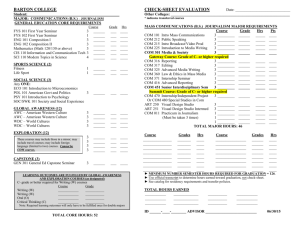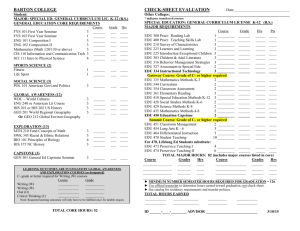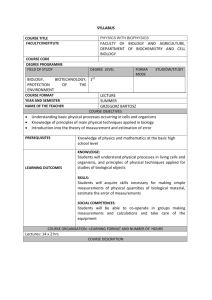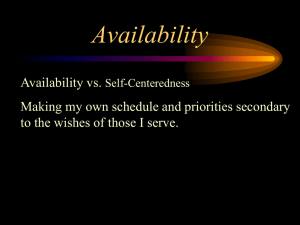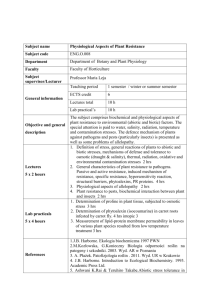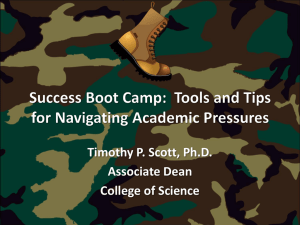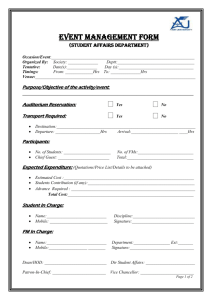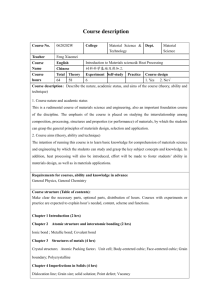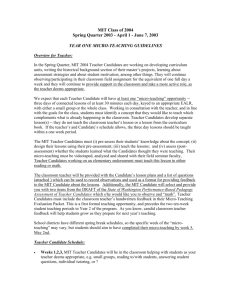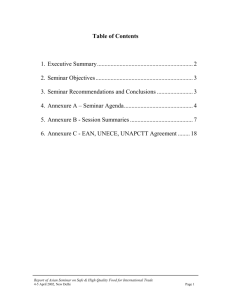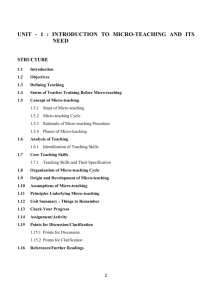1394537101DED 1203 - CURRICULUM AND TEACHING
advertisement
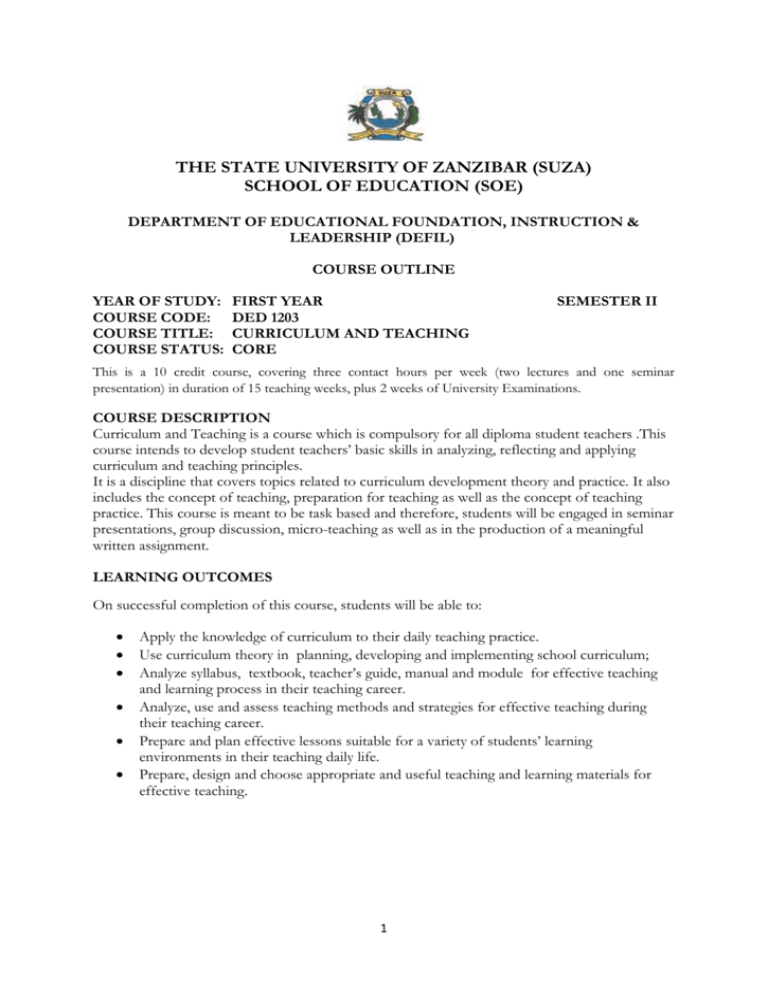
THE STATE UNIVERSITY OF ZANZIBAR (SUZA) SCHOOL OF EDUCATION (SOE) DEPARTMENT OF EDUCATIONAL FOUNDATION, INSTRUCTION & LEADERSHIP (DEFIL) COURSE OUTLINE YEAR OF STUDY: COURSE CODE: COURSE TITLE: COURSE STATUS: FIRST YEAR DED 1203 CURRICULUM AND TEACHING CORE SEMESTER II This is a 10 credit course, covering three contact hours per week (two lectures and one seminar presentation) in duration of 15 teaching weeks, plus 2 weeks of University Examinations. COURSE DESCRIPTION Curriculum and Teaching is a course which is compulsory for all diploma student teachers .This course intends to develop student teachers’ basic skills in analyzing, reflecting and applying curriculum and teaching principles. It is a discipline that covers topics related to curriculum development theory and practice. It also includes the concept of teaching, preparation for teaching as well as the concept of teaching practice. This course is meant to be task based and therefore, students will be engaged in seminar presentations, group discussion, micro-teaching as well as in the production of a meaningful written assignment. LEARNING OUTCOMES On successful completion of this course, students will be able to: Apply the knowledge of curriculum to their daily teaching practice. Use curriculum theory in planning, developing and implementing school curriculum; Analyze syllabus, textbook, teacher’s guide, manual and module for effective teaching and learning process in their teaching career. Analyze, use and assess teaching methods and strategies for effective teaching during their teaching career. Prepare and plan effective lessons suitable for a variety of students’ learning environments in their teaching daily life. Prepare, design and choose appropriate and useful teaching and learning materials for effective teaching. 1 COURSE CONTENT Weeks 1&2(6 hrs) CURRICULUM THEORY The Concept of Curriculum Importance of curriculum Types of Curricula Difference between content based curriculum and competency-based curriculum Week 3&4(6 hrs) CURRICULUM DEVELOPMENT The Concept of Curriculum Development Curriculum Development Models (Tyler , Taba., Wheeler & Kerr) Factors affecting curriculum and its development Stakeholders in curriculum development Curriculum Change and Innovation Weeks 5: (3 hrs)CURRICULUM COMPONENTS The curriculum aims, goals and objectives Curriculum content Curriculum materials Curriculum methods/strategies Curriculum Evaluation The curriculum aims, goals and objectives Meaning, differences and relationship Instructional objectives Week 6: (3 hrs)Curriculum Content Sources of curriculum content Criteria for selecting curriculum content Week 7 & 8: (6hrs)Curriculum materials Components of different curriculum materials Characteristics curriculum materials o The Syllabus o The Teachers’ Guide o The Textbook o Supplementary Curriculum Materials o Instructional Media Importance of different curriculum materials in T/L processes Week 9&10(6hrs) Teaching and learning approaches Methods, Strategies and Techniques of Teaching Utilization of Methods, Strategies and Techniques of Teaching Classroom Management and Organization Week 11: (3 hrs)Curriculum Evaluation Meaning & Importance Ways of curriculum evaluation (CIPP model) 2 Week 12-13: (6hrs) PLANNING FOR TEACHING Scheme of Work , Lesson Plan , Lesson Notes , log book (daily records ) and assessment book Components and significance of Scheme of Work , Lesson Plan , Lesson Notes , log book (daily records ) and assessment book Week 14: (3 hrs) Week 15: (3 hrs) TEACHING AND LEARNING RESOURCES Meaning of teaching and learning resources Types of teaching and learning resources Improvisation of teaching and learning resources using local available materials TEACHING PRACTICE The Concept of Teaching Practice Importance of teaching practice in teaching profession Types of Teaching Practice Assessment and Moderation of Teaching Practice Weeks 16 & 17 University Examinations METHODS OF INSTRUCTION Lecturing Group discussion Seminar presentation Guest speaker Micro-teaching ASSESSMENT METHODS Course work Test ( I & II) Seminar Micro-teaching 40% 20% 10% 10% University Examination 60% READING LIST 1. Arends , R. (1998): Learning to Teach. McGraw Hill: New York 2. Arends, R.I., Winitzky, N.E. & Tannenbaum, M.D. (1998): Exploring Teaching. McGraw Hill: New York. 3. Bloom, B. (1976): Human Characteristics and School Learning. McGraw Hill: New York. 4. Boorish, G. (1993): Effective Teaching Methods (3rd edition). Englewood Cliffs: New Jersey. 3 5. Bruner, J. (1960): The Process of Education. Cambridge: Harvard University Press. 6. Hooper, R. (Ed) (1983). The Curriculum Context, Design and Development. Open University Press: Great Britain. 7. Kelly, A. (1972). Planning the School Curriculum. UNESCO IIEP: Paris. 8. Lewy, A. (1989). The Curriculum Theory and Practices. Paul Chapman Publishing Ltd: London. COURSE INSTRUCTOR: Dr/Mr/Ms………………………………………. Office Number:……………………………….. Mob: …………………………………………… Email: ……………………………………….... 4
